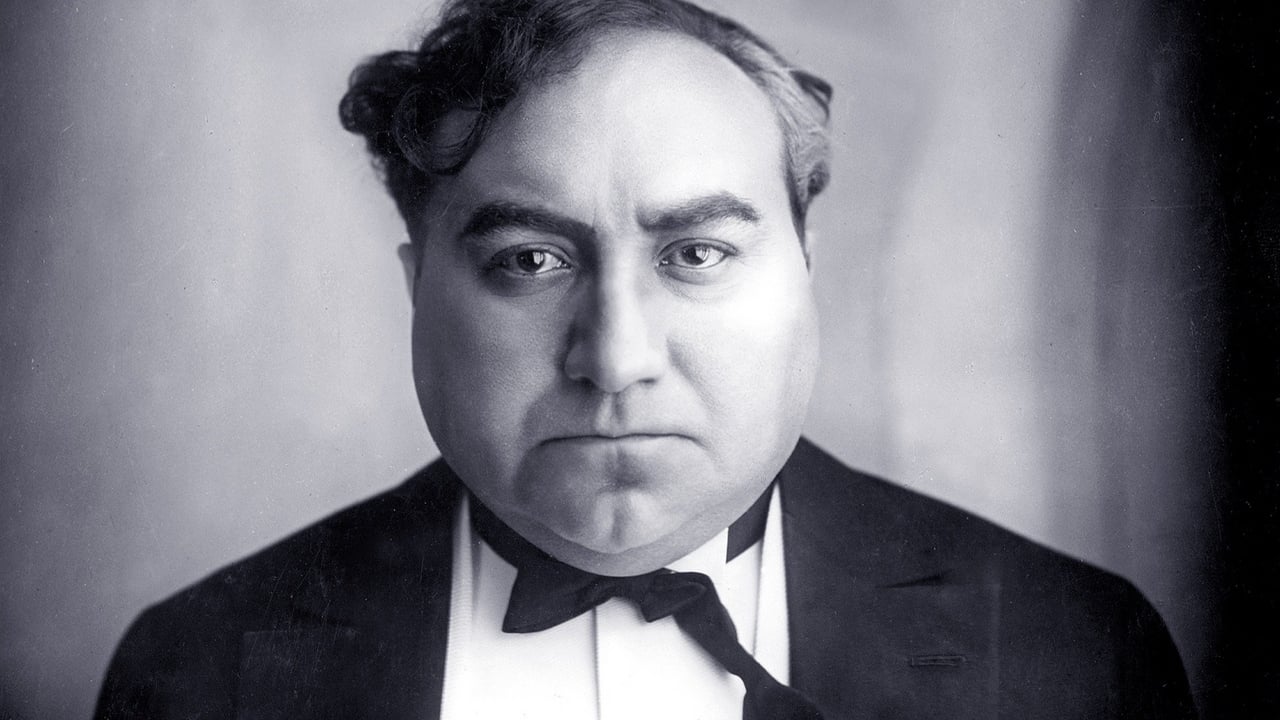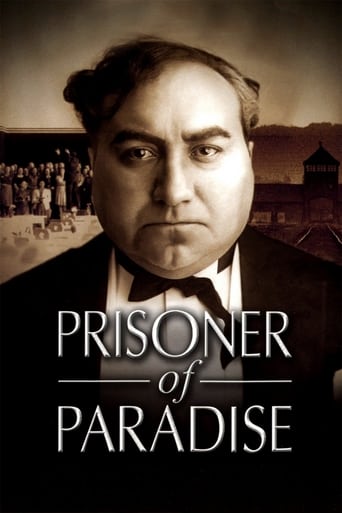BroadcastChic
Excellent, a Must See
Breakinger
A Brilliant Conflict
Bluebell Alcock
Ok... Let's be honest. It cannot be the best movie but is quite enjoyable. The movie has the potential to develop a great plot for future movies
Phillipa
Strong acting helps the film overcome an uncertain premise and create characters that hold our attention absolutely.
gavin6942
An excellent documentary about Holocaust victim and forgotten director Kurt Gerron.In 1944, Gerron was coerced into directing a propaganda film intended to be viewed in "neutral" nations (Switzerland, Sweden, Ireland) showing how "humane" conditions were at Theresienstadt. Once filming was finished, Gerron and members of the Jazz pianist Martin Roman's Ghetto Swingers were deported on the camp's final train transport to Auschwitz. Gerron and his wife were gassed immediately upon arrival, along with the film's entire performing entourage (except for Roman and guitarist Coco Schumann).The next day, Reichsführer SS Heinrich Himmler ordered the closure of the gas chambers.I had never heard of Gerron before seeing this film, which is not surprising given he was only successful in Germany and had not made the transition to American films like many others did. His association with Peter Lorre, Fritz Lang and others is interesting and one wonders what might have happened if he survived...
lanzarishi
I have just written 25 emails telling all of my closest friends to see this movie. It is the greatest documentary I have ever seen. I am in a state of shock at how moving this film is. Enough cannot be said to anyone connected with this film. I bow to all of you. This man Kurt Gerron should be praised and honored in no way that has been done before. Although he might be looked at as collaborating with the Nazi's as one narrator has stated, anyone else in his position would have done the same in his shoes and whoever says they wouldn't is a liar! What it must have been like to be in that place I can only guess but whoever had to live through that period (if they did survive) I personally owe a debt of gratitude to for bringing to life this documentary. PLEASE SEE THIS FILM!
alexduffy2000
"Prisoner of Paradise" is like no other Holocaust documentary that I've ever seen. It is an amazing true story.SPOILERS AHEADThis movie is really a film about a film. The film is "Theresienstadt", the 1944 Nazi Propaganda film directed by German Jew Kurt Gerron. Gerron was a German comedic actor who lost everything due to Nazi persecution, and he eventually ended up in Theresienstadt concentration camp in what is now the Czech Republic. The Nazis asked him to make a movie showing how Theresienstadt was a utopia built by Hitler for the Jews. The central question of this movie is: Should Gerron have said "No" or "Yes" to the Nazis? Surely if he had said "No" it would have meant a ride to Auschwitz on the next transport. But by saying "Yes" he would be a tool of the Nazis, and making the film in no way would guarantee his survival. What should he do? Gerron makes "Theresienstadt" for the Nazis. As soon as Gerron finishes making the film for the Nazis, almost all of the cast is sent to Auschwitz and gassed on 11 consecutive transports. Gerron is put on the 11th transport, and murdered with gas on the day he arrives in Auschwitz.Gerron receives equal parts condemnation and praise for making "Theresienstadt". Condemnation for selling out to the murderers of his own people. Praise for trying to survive the Nazis by any means necessary. But I think that maybe Gerron knew they were all doomed, and he knew this might be the only record of his fellow Jewish inmates before their end. So he films laughing teenaged girls, young men playing soccer, inmates putting on a play, and everybody was having fun, smiling, in this "utopia" Hitler built for the Jews. Of course you never see the SS guards with machine guns.In the end, Gerron beat the Nazis at their own game. Gerron shows the HUMANITY of Hitler's Jewish captives, the humanity Hitler sought to deny. How young so many of them were. How much they really wanted to live! But everyone of them is forced to wear the yellow star, which is their death sentence. It makes the horror of the Holocaust clearer than any stacks of dead, emaciated corpses, because this film show What Might Have Been. Everyone of these teenaged girls could have become a doctor, homemaker, anything... and they were all murdered (or most of them) for the sake of a crazy ideology."Prisoner of Paradise" is a very haunting film. It ranks with Claude Lanzmann's 9 1/2 hour "Shoah" as a landmark Holocaust film. It made me realize that it's not just the injustice of genocide that's so terrible, it's the human potential that is lost. So many young people who could have done something with their lives, and they never got the chance. This film will make you think.
Art Snob
On a recent weekend getaway to Toronto, I availed myself of the opportunity to see the only public screening in North America of one of the contenders for this year's best documentary Oscar . the joint American-Canadian production, PRISONER OF PARADISE. It's not the best documentary I've seen this year, but it's solid, deals with an interesting topic, and I strongly suspect that it's going to take home this year's prize. More on this later.Narrated by Ian Holm, the film opens with scenes of a utopian community lovingly described as being comprised completely of `like-minded individuals.' The grounds look well-kept, the people (especially the children) look happy and in good health, the arts flourish, and sporting activities are regularly enjoyed by all. But suddenly, Holm informs us that this seemingly-successful communal experiment is all . a huge lie.The `community' is actually the Nazi concentration camp of Theresienstadt, where prominent Jews who would be missed were congregated into a sprawling and photogenic (from the outside) old fortress whose barricades to external forces proved equally efficient at keeping prisoners contained. And the footage is from a particularly notorious piece of Nazi propaganda - `The Fuhrer Gives a City to the Jews' (1944), a film produced to dispel rampant rumors about the wholesale mistreatment and extermination of Jews by the Germans. The film then shifts the focus to the director of the film -- Jewish inmate Kurt Gerron, a onetime hugely successful character actor, cabaret performer and movie director in pre-Nazi Germany.If, by chance, you're a student of early cinema who's seen Josef Von Sternberg's classic, THE BLUE ANGEL, you've already seen a Gerron performance . he's the magician who uses the broken Emil Jannings as a stage prop late in the film. He also played the doctor in the Georg Pabst-directed Louise Brooks movie DIARY OF A LOST GIRL. On stage, he was the first performer to ever sing `Mack the Knife,' appearing in the original 1926 production of Bertolt Brecht's THE THREEPENNY OPERA. And besides being a success as a performer, he also directed some box office hits starring major German stars in the years immediately preceding the Nazi takeover. In terms of appearance, familiarity to audiences and show biz success, he was something of a German amalgam of Danny DeVito and Jackie Gleason.The first half of the film follows Gerron's odyssey to this final directing job -- from the beginning of his success as a performer . to his showbiz heyday . to his flight to France and then to Holland following the Nazi clampdown on Jews . to his capture following the German occupation of Holland . and finally, to his arrival at Theresienstadt. (A journey that included two missed opportunities to join friends like Marlene Dietrich and Peter Lorre, who'd successfully relocated to Hollywood.) The second half of the film deals with the situation at Theresienstadt, and features many interviews with survivors.In terms of documentary technique, the film is pretty much by the book, top-heavy with archival footage and talking heads. (There are also two re-creation scenes -- clearly labeled as such, thus averting a major documentary no-no that has cost Errol Morris dearly in the past.) But I never found my interest wandering at any time during the 97-minute running time. The survivors make it known that the prisoners resented Gerron's collaboration, but the filmmakers claim that Gerron consulted with Jewish elders before making it and received their permission to engage in an activity that would delay the word all detainees feared . `transport,' which meant delivery to a death camp.In terms of topicality, there's an interesting side story dealing with an evil regime successfully thwarting international inspection - what emboldened the Nazis to make the propaganda film in the first place was their unqualified success in convincing a visiting Red Cross inspector that everything was fine at the camp via a carefully orchestrated tour of the facilities. This aspect, coupled with four additional factors, should make it a very strong contender:1. Its `one of our own' main character (remember SHAKESPEARE IN LOVE beating out SAVING PRIVATE RYAN for best picture a few years back?)2. Its Holocaust-related theme (a traditional favorite in the documentary category - INTO THE ARMS OF STRANGERS, ANNE FRANK REMEMBERED, HOTEL TERMINUS, etc.)3. Its traditional documentary techniques . Hollywood frowns on creativity and visual panache in this category4. The desperation among Hollywood pragmatists to prevent Michael Moore from taking the podium in front of a world audience in these times
You make think that it's impossible for a film with such little exposure to trump the record-setting success of BOWLING FOR COLUMBINE, but for an MPAA voter to be eligible to vote for best documentary, he or she HAS to see ALL of the films in nomination at a theatrical screening and certify the date and place in writing. And one of the nominees (WINGED MIGRATION) is withholding the film from screenings, so only a tiny handful of voters are going to be voting in this category this year.If any of the eligible documentaries is going to galvanize anti-Moore sentiment among the aged (and far less liberal as a whole than you might suspect) MPAA members who ARE eligible to vote, this is the one. If it wasn't for the fact that he'd actually have to admit to SEEING Michael Moore's movie in order to be eligible to vote, I'd bet the FARM that PRISONER would be Charlton Heston's choice.

